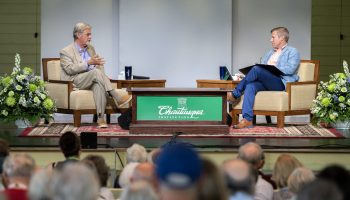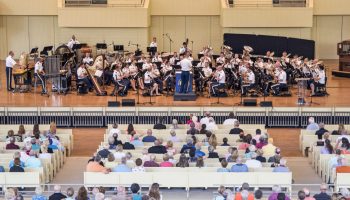“The spiritual life is not about being right, it is always about being righteous. It is not about being correct, but being in the arms of the Father,” said the Rev. M. Craig Barnes at the 9:15 a.m. Thursday morning worship service in the Amphitheater.
His sermon title was “The Gospel of the Right,” and the Scripture reading was Luke 15:28-32. He said to the congregation that by “right,” he meant “correct.”
Barnes told the congregation: ”We are in communion with God by what Christ did on the cross. Jesus was the embodiment of the God who is dying to love us through relationship, not by being correct.”
In following his theme, “The Gospel for the Elder Brother,” he said that in reality, the Elder Brother was right — he had made the right choices, he had been dutiful. The Prodigal was wrong, but by grace found his way into the arms of the Father.
The Elder Brother, who is right, is outside the arms of the Father.
“Can being right keep you from God?” Barnes asked. “Can being right be a sin?”
Being right is very important for Elder Brothers. Barnes said the Elder Brother is a symbol, not a real birth order or gender reference. It is significant that Jesus used the term Elder Brother, because Jesus was talking to people — the Pharisees — who were taught to be careful, responsible and fair.
As an example, Barnes said his older son, now 21, was consumed about being fair. If there was bacon cooking for breakfast he would ask, “How many pieces do each of us get?”
His younger brother just takes as much as he wants.
“It never occurs to him to just take two pieces, he is not even thinking about anyone else,” Barnes said. “He is hungry.”
“If I told my older son to take all the bacon he wanted,” Barnes added, “he would ask, ‘How many? What’s fair?’ ”
To be just and fair is part of the “cherished self-image” of the Elder Brother. The Elder Brother will only be at ease when there is justice in the world, when the rules are clear. Barnes said that his older son once said: “I wish life was like math. There is always a right and wrong answer.”
Elder Brothers are taught to achieve; they are always under pressure to do well.
Barnes said that his daughter decided she wanted to be a ballerina “when what she really wanted to do was wear a tutu.” When it came time for the yearly recital, he said it was “interesting.” Barnes overheard another father say to his wife, “Well, there’s always ROTC.”
Elder Brothers can never achieve enough, they can never be satisfied. They don’t need to always win, but they need everyone to follow the rules.
Barnes said as a pastor, he was encouraged to preach on sin, judgment and guilt.
“I call these ‘bad dog sermons,’ ” he said. “People want me to stand in the pulpit, wag my finger at them and say, ‘Bad dog, bad dog, look what you did.’ ”
“Why do good people want to hear about judgment?” he continued. “Because it is what they know best. They have been judged since they were born.”
He once visited a parishioner who had just given birth to a son. Barnes went into the room and the mother was crying, but they were not tears of joy. She was crying because her child got an 8.5 out of 10 on the Apgar test, a simple assessment of children at birth.
“He just got his first ‘B-,’ ” the mother said.
Barnes told the congregation that children are judged by their parents, and when people become parents, their children judge them.
“From teachers, coaches, bosses, friends, siblings, even the person in the mirror — the verdict is you are not good enough,” he said.
Grace is confusing for Elder Brothers because they are working so hard, but they cannot get an “A” on grace. Life is pass/fail, he said, and “all you have to do to get a pass is to ask for it. You can’t be right.”
Barnes emphasized that it was through relationships with God that people experience grace, not by being correct.
Barnes’ father was a Baptist pastor who had a congregation that was full of Prodigals with dramatic conversions. One time, Barnes had a Sunday school teacher who was a new convert and did not know the Bible well but loved children.
She was telling the story of Noah and the ark.
“I let slide a couple of mistakes,” Barnes recalled. “But at one point she said that it rained for four days and four nights and wasn’t that just terrible. I said that actually it had been 40 days and 40 nights — and wasn’t that more impressive? She ran out of the room, crying.”
His father stopped the car on the way home from church so that he and Barnes could have a conversation. Barnes told his father what happened and said, “I was right.”
“You really hurt her,” his father said, “and no, you were not right. Someday you will understand that relationship is righteousness.”
In the parable of the Prodigal Son and the Elder Brother, the two brothers had a distorted relationship. The Elder Brother told the Father that “this son of yours” was lost, putting distance between himself and the Prodigal.
The Father said to the Elder Brother, “this brother of yours” was lost and is returned and you need to re-establish a relationship with him.
“These two are not just sons, they are brothers and they need to be restored to each other,” Barnes said. “The Elder Brother is just dead right.”
Jesus was talking to the Pharisees in this parable.
“They were good people who lived careful lives,” Barnes said. “They were confused by Jesus, who had a tendency to make room for sinners.”
Barnes said that Saul of Tarsus is the most famous Pharisee convert. Most conversion stories start with “I was really bad and then I met Jesus.” Paul’s conversion story begins, “I was blameless under the law and then I met Jesus.”
As Saul of Tarsus, his job was to make sure nothing changed.
“Elder Brothers love that job,” Barnes said.
The new sect that became Christianity was the biggest change in Saul’s life.
But Paul acknowledged that when he met Jesus, he found out there was more to God than he knew.
“That is conversion,” Barnes said. “There is more to God than I knew. God loves to convert religious people.”
Religious people have to ask themselves, “Could I be wrong?” Barnes said.
“Even if you have done things right, until you see that there is more to God than you know, you can’t change,” he said. “Change only comes with your change of vision about who God is.”
The opening line of theologian John Calvin’s Institutes of the Christian Religion is, “Our wisdom, in so far as it ought to be deemed true and solid Wisdom, consists almost entirely of two parts: the knowledge of God and of ourselves.”
Your self-image, Barnes said, is determined by your image of God. If you have a distorted image of God, you will have a distorted image of yourself. People who are angry often worship an angry God, and people who have problems with intimacy often can’t believe that they are loved by God.
“Until your image of God changes, you cannot change,” he said.
The church in Damascus had been hiding from Saul, but God told its leader, Ananias, to seek out Saul. Ananias went and laid hands on Saul and he became “Brother Saul.” There was more to God about what was going on in the life of its persecutor than the church knew.
“The church has always overcome persecution by out-loving the persecutors,” Barnes said.
What if God is at work in someone who has hurt you or is a threat to what you believe or you have built?
“To whom should you reach out to and say ‘Brother Saul’ ? ” Barnes asked. “Don’t live with fear and anger. Reach out and say, ‘You are a child of God, Brother Saul.’ ”
The Rev. Robert Hagel presided. The Rev. Susan Cartmell read the Scripture. A minister in the United Church of Christ for 35 years, she is currently pastor of Pilgrim Church in Harwich Port, Massachusetts. She is the author of UnCommon Preaching: An Alternative to the Lectionary. She always remembered a childhood visit to Chautauqua and found her way back in 2009 and has come with her wife, the Rev. Peggy O’Connor, ever since. She served as chaplain of the UCC House in 2010. Barbara Hois, flute, and Joseph Musser, piano, played J.S. Bach’s Sonata in E Minor for the prelude. The Motet Choir, under the direction of Jared Jacobsen, organist and coordinator of worship and sacred music, sang “If ye love me,” by Thomas Tallis. The Gladys R. Brasted and Adair Brasted Gould Memorial Chaplaincy provides support for this week’s services.




